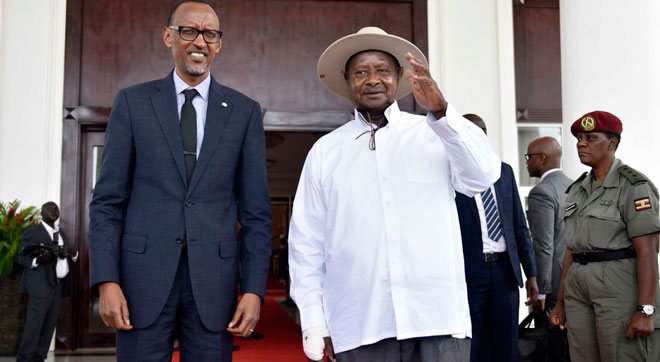
It restores the Rwandan Bloc vote for Museveni in 2021 and smoothens CHOGM2021 preparations for Kagame
COMMENT | SIMON KIMOYI | It is not far-fetched for Kigali to postulate that promoters of the Uganda-Rwanda conflict are top officers in the Ugandan security system, seeking to cause regime change in Kigali.
Ugandans might believe this theory because no official alternative has come forth from Kampala. It helps them explain why, for 22 years now since the armies of Uganda and Rwanda first clashed in 1998 in eastern DRC, the cause of that bloodbath remains a preserve for the perpetrators.
What is certain is that the trigger was not accidental. It was deliberate—the reason for the multiple recurrences—in 1999, 2001, 2003 and the current diplomatic spats. This cause can never be made public because it is not promoting Ugandan interests but those of private individuals. Therefore, one of the logical responses to resolving this conflict, is to deprive its perpetuators the opportunity of misusing Uganda’s facilities and resources to their advantage. And this could inform the wisdom behind the appointing authority’s latest appointment of new directors in the Internal Security Organisation (ISO); Col Oluka and his deputy, Taban Amin who are typical Ugandans from regions—with the remotest connection to Rwandan affairs.
After Kaka exit Rwanda could reopen border soon
Among major reasons that prompted the October 8 changes in ISO was the need to respond to Rwanda’s conditions for reopening the common border. Since the last regional Quadripartite meeting of February 21 at Gatuna border post, Kigali has been pushing for this. It is also asking for axing of the regional cooperation state minister, Philemon Mateke. To Kigali, these officials and a host of others are facilitating activities of its two main dissident groups—the Rwanda National Congress (RNC) and RUD-Uranana. Common about these officials is their Rwandan ancestry dating from pre and post-independence period. Kigali, therefore, faults them of being directly responsible for the tension between the two countries. It accuses them of confusing Museveni with hoax intel to drive home their agenda—through the armed RNC of Gen Faustin Kayumba Nyamwasa; the now exiled former Rwandan army chief. Nyamwasa is born of Ugandan parents of Rwandan origin.
Kigali expected Kampala’s internal reciprocation
Rwanda has already relieved of duty a number of its officials that were previously related to the Ugandan dossier. It expected Kampala to act similarly. Among key recent changes in Kigali are the minister for regional cooperation, Olivier Nduhugirehe and External Intelligence chief Col. Anaclet Kalibata. Also the contract for the long serving Rwandan ambassador to Uganda was not renewed upon expiry this year.
Besides Lt Col Kaka and minister Mateke, Kigali blacklists other Ugandan officials including Brig Abel Kandiho of CMI, Brig Fred Karara of UPDF and Col Charlese Asiimwe of counter terrorism. Museveni may not go all-out to act like Kagame in discharging these officials. Their mention here, however, entails that they should demonstrate reform of their individual attitudes towards the question of Rwanda.
The Anticipated Return of ‘Rwandan-Ugandan Voters’
Hundreds of Rwandans have confessed enjoyment of double-voting rights in Uganda and Rwanda. Their mention of Uganda obviously tells who the beneficiary is. Therefore, in the current circumstances both Museveni and Kagame are desperate to see the common border reopened soon. One; it boosts Museveni’s election fortunes with the highly anticipated flooding in of Rwandans already registered as voters in Uganda but currently restricted of movement within Rwandan boundaries. Two; it makes Kagame softly begin to benchmark from Uganda’s experience and participation in organising the ‘RWANDA CHOGM-21’ due mid next year.
CHOGM, the meeting of over 54 leaders of former British colonies represents a third of the world’s population. It would look awkward and shameful on the part of Rwanda for neighbouring Uganda to miss out due to a flimsy conflict.
****
Simon Kimoyi is a PhD Candidate, Kampala International University
 The Independent Uganda: You get the Truth we Pay the Price
The Independent Uganda: You get the Truth we Pay the Price


